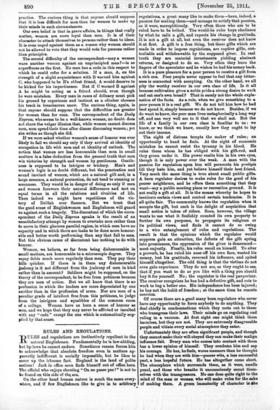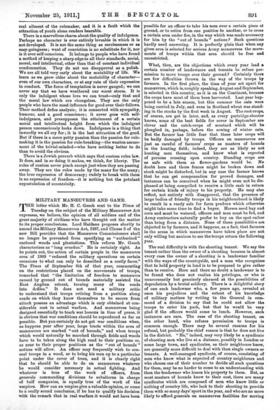RULES AND REGULATIONS.
RULES and regulations are instinctively repellent to the natural Englishman. Fundamentally he is law-abiding, but by-laws he cannot endure. Sometimes reason forces him to acknowledge that absolute freedom even in matters ap- parently indifferent is socially impossible, but he likes to cover up the irksome fact. England is the land of polite notices ! Jack in office soon finds himself out of office here. The official who enjoys shouting " On ne passe pas !" is not to be found on this side of the sea.
On the other hand human nature is much the same every- where, and if few Englishmen like to give in to arbitrary regulations, a great many like to make them—have, indeed, a passion for making them—and manage to satisfy that passion, as it were, surreptitiously. Very often those who are to be ruled have to be bribed. The would-be ruler buys obedience by what he calls a gift, and expects his change in gratitude. It is not a gift at all, but even the receiver does not know it at first. A gift is a free thing, but these gifts which are made in order to impose regulations, are captive gifts, con- trollable and withdrawable by the supposed giver. In real truth they are material investments yielding abstract returns, or designed to do so. Very often they burn the fingers of the speculator and he wishes he had his money back.
It is a pure pleasure for a poor person to receive a gift from a rich one. Poor people never appear to feel that any bitter- ness is connected with accepting. On the other hand, we all pity the worthy receiver in our own class of life. Is it all because cultivation gives a noble pride a strong desire to work and eat one's own bread? That is surely not the whole expla- nation of the facts. As a rule, when we give something to a poor person it is a real gift. We do not tell him how he had best spend it, simply because we do not know. Besides, if we do want to know, the poor man lives metaphorically a long way off, and can very well see to it that we shall not. But the life of a family in our own class is familiar to us : we know, or we think we know, exactly how they ought to lay out their income.
The sight of distress tempts the maker of rules ; an opportunity to hand he feels. At the sight of economic mistakes he cannot resist the tyranny in his blood. He rules those whom he has obliged with his gift-rod, and they groan under it His power exalts him in his own eyes, though it is only power over the weak. A man with the passion for regulation upon him will persecute his proteges till they hate him, and yet believe himself their beat friend. Very much the same thing is true about small public gifts. A born regulator desires to make rules for the good of his poorer neighbours, and he offers them something that they want—say a public meeting place or recreation ground. It is not really a gift at all. It is the means whereby he hopes to inculcate certain views and control certain tendencies. It is all quite fair. The community knows the regulation when it accepts the gift, but such is the delight of acquisition that small notice is taken of riders. Soon, however, the village wants to use what it foolishly counted its own property to further its own purposes, to propagate its religious or its political views, and finds it cannot do so owing to a wire entanglement of rules and regulations. The result is that the opinions which the regulator would suppress gain an attraction, the defects of the gift spring into prominence, the oppression of the giver is denounced— most unjustly. Finally, his rules recoil on himself. To alter a proverb, he has ruled his nose off his own face, wasted his money, lost his gratitude, reversed his influence, and spited himself altogether. The odd thing is that the victims do not even gain experience. They do not see, as they ought to see, that if you want to do as you like with a thing you should buy it for yourself. No; the regulator is the real pauperizer. The receiver recognizes he has had a, defective gift, and sets to work to beg a better one. His independence has been injured; he has not the habit of freedom ; at the same time he resents coercion.
Of course there are a good many born regulators who never have any opportunity to force anybody to do anything. They deal chiefly in condemnations which they mete out to those who transgress their laws. Their minds go on regulating and ruling in a vacuum. At first sight one might think them harmless, but they are not. They are extremely disagreeable people and vitiate every social atmosphere they enter.
Unfortunately they are often significant people, and though they cannot make their will obeyed they can make their malign influence felt. Every man who comes into contact with them has a lower opinion of himself. They condemn him and sap his courage. He has, he feels, worse manners than he thought he had when they are with him—poorer wits, a less successful past, a less hopeful future. He has altogether come short. The atmosphere which surrounds them, as it were, smells penal, and those who breathe it unconsciously count them- selves with the transgressors. No one does quite right to the mind of the man or woman who will make rules for the sake of making them. A green immaturity of character is -the real ailment of the rulemaker, and it is a fault which the attraction of youth alone renders bearable.
There is a marvellous charm about the quality of indulgence. Perhaps no character is ever entirely loveable in which it is not developed. It is not the same thing as carelessness or as easy-goingness ; want of conviction is no substitute for it, nor is it ever self-conscious. It belongs to people who have found a method of keeping a sharp edge to all their standards, social, moral, and intellectual, other than that of constant individual condemnation. They do not use disapproval as a polish. We are all told very early about the mutability of life. We learn as we grow older about the mutability of character— even of our own characters, or at any rate of their expression in conduct. The force of temptation is never gauged; we can never say that we have weathered our worst storm. It is only the indulgent whose love we can trust—only that and the moral law which are changeless. They are the only people who have the most influence for good over their fellows. Their method defies analysis; it is connected with sympathy, humour, and a good conscience ; it never goes with self- indulgence, and presupposes the attainment of a certain moral and intellectual height from which the indulgent person unconsciously looks down. Indulgence is a thing that inwardly we all cry for ; it is the last attraction of the good. But if there is a more petty passion than the passion for rule- making it is the passion for rule-breaking—the wanton amuse- ment of the trivial-minded—who have nothing better to do than to avoid the obvious.
There is a Jewish proverb which says that custom rules law. It does, and in so doing it makes, we think, for liberty. The rules of custom never pinch except just when they are passing away. They are the rules made by the many for the many; the true expression of democracy; rudely to break with them is no expression of freedom—it is nothing but the petulant expostulation of eccentricity.



















































 Previous page
Previous page